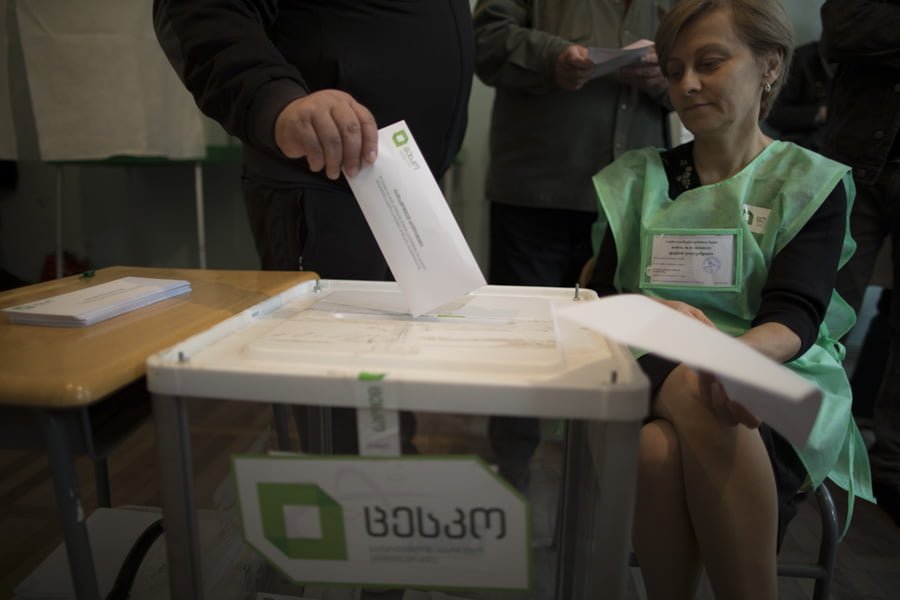
Int’l Assessments on Georgia’s Electoral Reform Agreement
On March 8, representatives of the ruling Georgian Dream party and the opposition signed an agreement paving the way to adopting an electoral reform for October 2020 parliamentary elections. The agreement envisages introducing a parliamentary composition based on 120 proportional mandates and 30 majoritarian seats (change from 77/73 system), a fair composition of 30 single-mandate constituency districts, a 1% threshold, and a cap recognizing that no single party that wins less than 40% of the votes should be able to get its own majority in the next parliament.
The U.S. Embassy in Georgia, European Union’s Delegation to Georgia, and Georgian Office of the Council of Europe, having actively facilitated the talks, endorsed the agreement, dubbing it as a “crucial step towards depolarization and normalization of the political environment in Georgia in the run-up to the parliamentary elections later this year.” They further hailed March 8 agreement “as a stepping-stone on Georgia’s democratic path.” They called on all sides to adhere to the agreement and to safeguard its successful adoption by the lawmakers and subsequent implementation.
We are pleased that today the participants of the political dialogue reached a successful agreement. This is an important step in the run-up to the parliamentary elections.https://t.co/D16PwYbp15
— U.S. Embassy Tbilisi (@usingeo) March 8, 2020
Hubert Knirsch, German Ambassador to Georgia hailed the agreement as “a great achievement for all Georgian political parties, they all win from it.” “All the political forces of Georgia are on board here. This is a remarkable achievement,” Ambassador Knirsch told Civil.ge, adding that “I see that as good-will from all political parties to also implement this agreement in good faith and they have committed to work together to implement it.” He concluded that “in fact, Georgia will avoid impression to be slipping back on its path to democracy. This is exactly what the international partners support – they support not one or the another party, but Georgia on its way to democratic and social development.”
Ulrik Tideström, Swedish Ambassador to Georgia, welcomed the agreement as an “important step towards depolarization and better political environment in the run-up to the parliamentary elections.”
Welcome that ?? government and opposition parties reached agreement on election system. Important step towards depolarization and better political environment in run-up to parliamentary elections.
— Ulrik Tideström ???? (@UTidestrom) March 8, 2020
Diégo Colas, French Ambassador to Georgia, commended all participants in the dialogue for showing “a great sense of responsibility.”
Congratulations to all participants in the dialogue who have shown a great sense of responsibility, and to the facilitators for their work. This is a very welcome step towards lesser polarization and should contribute to elections meeting the high standards that Georgia deserves https://t.co/effzx4P6wq
— Diégo Colas (@ColasDiego) March 8, 2020
Ingibjörg Sólrún Gísladóttir, Director of the OSCE Office for Democratic Institutions and Human Rights (ODIHR), also approved the said agreement, promising a “a thorough assessment [of its implementation] by ODIHR election observers on the ground.”
Glad to see agreement in #Georgia over changes to the election system. Once adopted, this is very important in the run-up to the parliamentary election later this year, pending a thorough assessment by ODIHR election observers on the ground. https://t.co/BfoaMBSXxm
— Ingibjorg Solrun Gisladottir (@ingibjorgSolrun) March 8, 2020
Congressman Adam Kinzinger (R-Illinois), who co-chairs the U.S. House Georgia Caucus, congratulated Georgian people for reaching an agreement on the 2020 parliamentary elections. “Democracy is hard work, but worth it,” Kinzinger tweeted.
My heartfelt “congrats” to the people of #Georgia for reaching an agreement on the 2020 parliamentary elections. Democracy is hard work, but worth it. Speaker Talakvadze and many others deserve appreciation for their work. Larger statement to follow later.
— Adam Kinzinger (@RepKinzinger) March 8, 2020
OSCE Parliamentary Assembly Vice-Presidents Margareta Cederfelt (MP, Sweden) and Kristian Vigenin (MP, Bulgaria), who headed the mission observing the October 2018 presidential election in Georgia, issued a statement welcoming “a historic agreement”, which, if successfully implemented, “could serve to build confidence among all factions in the country’s political system.” They urged the political forces in Georgia to carry on their efforts to “build a democratic system that works for everyone and avoids politicization of the judicial and electoral processes.”
Georgian Dream, Opposition Reach Consensus over Electoral Reform